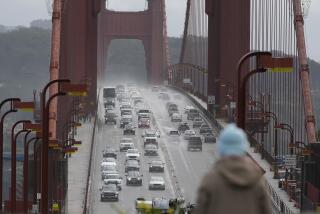A Step, at Least, in Auto Safety
Congress didn’t go as far as it should have last week in hammering out a compromise on new auto safety legislation. A gaping loophole remains in the Transportation Recall Enhancement, Accountability and Documentation Act, with its too-cute acronym of TREAD, which sets criminal penalties of up to 15 years for company executives who knowingly hide information about product defects. Nevertheless, the legislation takes a big step beyond the current toothless enforcement regimen.
Moreover, new court pressures from California and five other states may increase the heat on Congress and the next administration to do more to protect American consumers.
TREAD, passed by unanimous consent in both houses, is expected to be signed by President Clinton this week. It is important to note, however, that Congress had a shot at a tougher bill sponsored by Sen. John W. McCain (R-Ariz.). McCain was unable to get his legislation to the floor for a vote despite being chair of the powerful Senate Commerce Committee. Some of McCain’s Senate colleagues blamed time pressure from the impending election recess. More likely, tire and auto industry lobbying pressure helped block it.
The bill that did pass contains a so-called “safe harbor provision” allowing executives to avoid jail if they later come forward and disclose defects. Detractors say this allows manufacturers to hide problems right up to the time when a flaw is likely to be discovered by regulators. Nevertheless, TREAD makes important strides. It compels auto and tire manufacturers to report overseas product recalls to U.S. regulators within five days. It also raises the maximum civil penalty against manufacturers at fault to $15 million from the current $925,000. The bill further requires manufacturers to report to federal regulators any claims submitted to the manufacturer for personal injury, including death, and property damage from alleged defects in tires or other equipment.
There’s more. The act gives the National Highway Traffic Safety Administration greater powers to obtain information from foreign and domestic sources. It directs the federal government to conduct motor vehicle rollover tests and to inform the public of the results. Additionally, the law requires the NHTSA to improve the safety standards of child safety seats and to set a standard for vehicle booster seats for children ages 4 to 8 and weighing between 40 and 80 pounds.
Last week’s landmark ruling by an Alameda County Superior Court judge also adds pressure on manufacturers, requiring Ford Motor Co. to recall up to 1.7 million Ford, Lincoln and Mercury vehicles with an alleged ignition problem that reportedly has caused vehicles to stall. Ford insists its vehicles are safe, but the company has settled about 15 injury and death claims related to the problem.
The ruling by Alameda County Judge Michael Ballachey, which Ford will appeal, applies to vehicles sold in California. But similar lawsuits are pending in Tennessee, Illinois, Alabama, Maryland and Washington.
Ford and other auto manufacturers have a strong argument in saying that state judges should not be allowed to set different recall policies in each any state. In that case, Ford and other manufacturers ought to be willing to accept tougher federal scrutiny, and the Congress should give regulators more of the powers they need to do the job.





